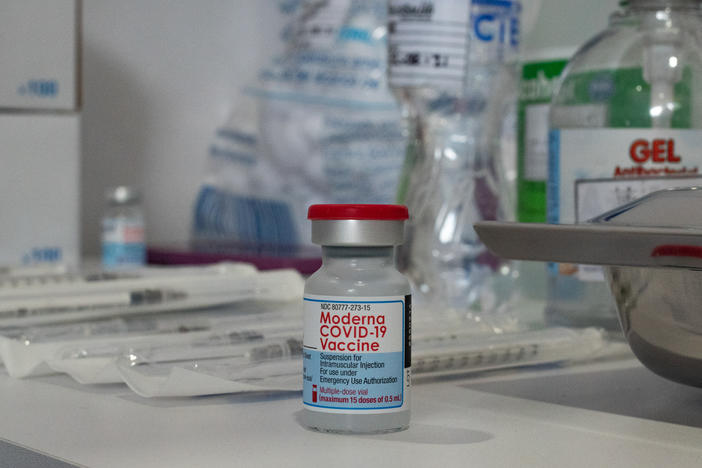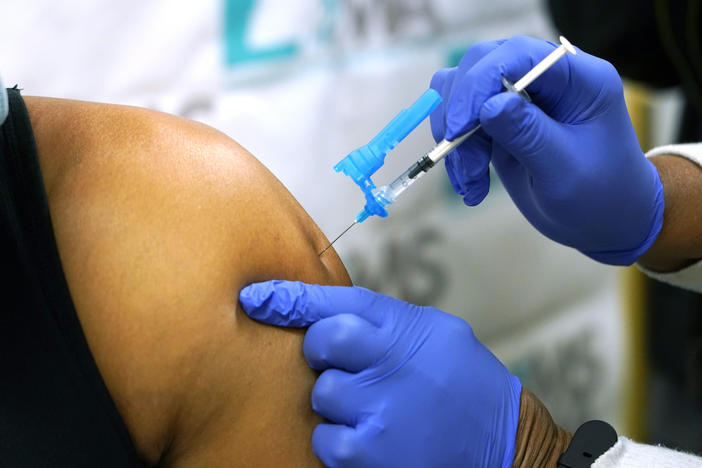Section Branding
Header Content
A Coronavirus Vaccine Could Kill Half A Million Sharks, Conservationists Warn
Primary Content
The use of an immune-system stimulant harvested from shark liver oil in the development of some coronavirus vaccines has animal conservationists pressing for alternatives.
Transcript
SCOTT SIMON, HOST:
The global race to develop a coronavirus vaccine continues. And an ingredient being used in some vaccine candidates has animal conservationists worried. Squalene is produced in the livers of sharks. The Shark Allies Conservation Group estimates that as many as half a million sharks could be killed in the quest for a coronavirus vaccine. Stephanie Brendel is executive director of Shark Allies and joins us from Southern California. Thanks so much for being with us.
STEPHANIE BRENDEL: Thank you. I'm very happy to be here.
SIMON: Why is squalene an ingredient in the vaccine candidates?
BRENDEL: Squalene is used as an adjuvant in a vaccine, so it helps the immune system. It stimulates the immune system. So it is not the antigen, but it is pretty much like a booster. It makes the vaccine more effective. And it makes it possible to use less of the antigen.
SIMON: It's being used already. And there are sharks already killed for this ingredient.
BRENDEL: Yes, it has been used in past vaccines. And it certainly is used a lot in cosmetics. But in vaccine application, it has been used in influenza vaccines and in the treatment of some coronaviruses. And currently, it is used in some of the COVID-19 vaccines that are in development. And, of course, that means that it would also be used in the future of the development of more vaccines, you know, for more coronaviruses.
SIMON: Yeah. And if everybody in the world has to get this vaccine, what could that do to the shark population?
BRENDEL: Well, that was really when we started to pay attention because we didn't think before that it would be such a problem because of the small amounts. But once we consider that this is global, you know, billions of people - probably not everyone will get it, but billions of people will. The problem is, is that squalene as an ingredient in a COVID-19 vaccine will be seen as something that's unavoidable. And then as it becomes tested, it becomes the normal ingredient, and nothing else will be tested. And plant squalene or squalene derived from anything else, such as algae or bacteria or synthetically, is basically the same compound, and it can be used. So really, our ask is that we start testing the alternatives because long term we cannot rely on a wild animal resource for a global need of anything.
SIMON: I mean, I'm hardly an expert, but it strikes me that it has to be easier to get squalene from algae than it is from a shark.
BRENDEL: The process of extracting it is slightly more difficult because, of course, livers of sharks are filled with oil. And it's a little bit easier to extract it. And you get higher volume than from a plant. Imagine an olive or sugar cane. You know, it doesn't have as much oil per pound or per item. But what we have been finding out is, is that the purification process must make up for that because sharks, you know, they filter out a lot of the pollution and the disease from the ocean. It ends up in their liver. So purifying something like that must be quite hard.
SIMON: I wonder, Ms. Brendel, what would you say to those who might say, look; if it's a choice between people and sharks, I'm choosing people?
BRENDEL: Of course. And we're not even contesting that. We would have never even brought this to light if it seems as if sharks are the critical ingredient that would make or break a vaccine. The truth is, is that we waited until we confirmed that alternatives already exist and can be used. And even though, for the first round of vaccines, we may be too late. If they're in testing and they have been tested with shark squalene, then so be it. That's what we're going to use. But at what point do we start testing the alternatives? Because long term, there has to be a switch. Humans do not have to die because we're saving sharks. As a matter of fact, if we can protect sharks, that's also good for humanity because we need them for the ocean. They keep our fish stock healthy. They keep the food chain intact. They keep diseases out of other animal populations. And they keep those populations strong because of pressure from predators. Good luck trying to replace that once we lose them.
SIMON: Stephanie Brendel is executive director of Shark Allies. Thank you so much for being with us.
BRENDEL: Thank you. Transcript provided by NPR, Copyright NPR.
Bottom Content



